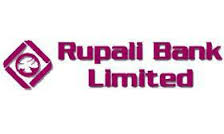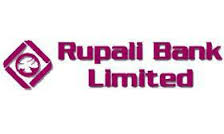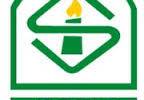Historical Background
Rupali Bank Ltd. was constituted with the merger of 3 (three) erstwhile commercial banks i.e. Muslim Commercial Bank Ltd. Australasia Bank Ltd. and Standard Banks Ltd. operated in the then Pakistan on March 26, 1972 under the Bangladesh Banks (Nationalization) Order 1972 (P.O. No. 26 of 1972), with all their assets, benefits, rights, powers, authorities, privileges, liabilities, borrowings and obligations. Rupali Bank worked as a nationalized commercial bank till December 13, 1986.
Rupali Bank Ltd. emerged as the largest Public Limited Banking Company of the country on December 14, 1986.
Vision, Mission, Guiding Principles of Rupali Bank Ltd.
Vision
Rupali Bank Ltd. dreams poverty free Bangladesh, where sports & athletics, science and education, health and hygiene, clean and pollution free environment and above all a society based on morality make all our lives worth living.
Mission
The Bank participates actively in socio-economic development of the country by performing commercially viable and socially desirable banking functions.
Guiding Principles of Rupali Bank Ltd.
- Transparency and accountability.
- Zero tolerance on corruption and inefficiency
- Flexibility in operation
- Constant review of clients’ performance
- Other guiding principles includes decentralization and devolution, defining roles and responsibilities, use of state of art modern technologies, bottom-up approach in planning, partnership etc.
Corporate Social Responsibility (CSR)
Rupali Bank Ltd. RBL has been rendering various services for attaining greater social goals and objectives. In this process, we aim to the development of the society as a whole and fulfillment of corporate social obligation in particular. To reinforce CSR activities, the bank has undertaken fresh initiatives in line with Bangladesh Bank guidelines in the areas of social service. Internship employment of poor, sports and culture, banking for the disadvantaged group, disaster and relief and activities.
Rupali Bank Training Institute
Since 2009, as many as 602 officers were imparted training by Rupali Bank Training Institute through 24 courses/ workshops including 10 foundation courses to the newly joined probationary officers throughout the month and the course relating to Fake Note Detection, BACH program, Money Laundering Prevention Act, Core Risk, Foreign Exchange and Computer. As many as 105 trainees have participated in 43 courses in BIBM. In addition to this, 18 trainees took part in 12 courses conducted by Bangladesh Bank and other institutions outside.
Computer Operation and Application of Information Technology
Extensive activities on computer technology and their implementation have been undertaken by this bank during the year in question. Till 2009, the number of computerized branches stood at 145. The work relating to change of old computers in previously computerized 31 branches is in progress. Remittance and EFT System have been modernized and arrangement for Money Transfer through Western Union in 71 branches has been made operative. On-line Banking with foreign Exchange Branches at Dhaka and Agrabad Branch of Chittagong has been introduced. The vendor institution has started preliminary activities to introduce On-Line banking operation on test basis in 10 more branches of the bank. The information of 25 Divisions of Head Office are being publicized through Bank’s own website (www.rupalibank.org). In order to expedite the flow of information 10 Internet of 64 kbps (shared line) and 10 Internet line of 256 kbps (dedicated line) have been installed in Head Office. The supply and installation of necessary hardware and software including communication link with Bangladesh Bank have been made. SIT (System Integrity Test) with Bangladesh Bank is in completion and prepared to operate in live at any time as per instruction of Bangladesh bank.
Legal Activities
As regards the recovery of default loans, the number of the suits such as original suits under trial, execution suits, appeal/ others and suits in Bankruptcy Court field by the Bank stood at 4570 with an involvement of Tk. 1603.29 crore. The number of the suits in which the certificates issued for possession and enjoyment of the mortgaged property by the court is 501 involving Tk. 82.03 crore; the suits field against the bank were 156 involving Tk. 327.93 crore; the IRO suits 110; the suits disposed of 294 involving Tk. 222.28 crore. The suits newly filed 42 involving Tk. 89.18 crore and the recovery through suits amounts to Tk. 222.28 crore. The number of lawyers conducting the suits in Dhaka Metropolitan area is 110 and in other areas 236. Besides these, the number of writs arising from Artha Rin Adalat Act, 2003 pending for disposal is 304 at the end of the year in question.
Other Banking Activities
94 branches of our bank are engaged in works relating to the payment of portion of salaries afforded by the government to the teachers and employees of registered non-government educational institutions including teachers of non-government educational institutional, 98 branches relating to the payment of scholarship and stipends to the girl students at primary and secondary levels and 69 branches relating to the payment of stipends to the girl students at primary and higher secondary level. In addition to those, almost all the branches of Rupali Bank are engaged in work relating to the payment of pension bill to the retired government, civil and military personnel and the receipt of utility bills such as PDB, DESA, REB, WASA, GAS & Telephone etc. including other service-related work of the government (such as receipt of Municipal Tax and Land Development Tax, purchase and sale of Prize Bonds, receipt of Hajj money etc).
General Banking Introduction
It is most important side of the bank. Bank is nothing but a middleman between lenders (surplus unit) and borrowers (deficit unit). To provide loan, a bank needs a huge amount of money from the depositors. General banking is the side where banks offer different alternatives to the clients to deposit and remit their money. To encourage the clients, bank offers different options in front of their clients. Most of these options are very much similar between the banks, but the customer services and facilities may not be the same. Every Branch of Every Bank has to maintain the General Banking department. It takes Care of lot of important banking activities mainly collecting the deposits from customers. Rupali Bank Limited, Johnson Road Corporate Branch has all the required sections of General Banking.
The Local Office is equipped with the following sections of general banking:
- Account Opening
- Telegraphic or Telephonic Transfer (TT)
- Pay order
- Demand Draft (DD)
Account Opening Section
The relationship between the banker and the customer begins with the opening of an account by the customer. Initially all the accounts are opened with a deposit money by the customer and hence these accounts are called deposit account. Usually a person needs to open an account to take services from it. Without opening an account, one can get only a few services from the bank. So the banking begins actually by the opening of an account with a bank.
Formalities maintained for Opening an account
Application on the Prescribed form
The person willing to open a current account with the bank has to make application in the prescribed form. This form must be properly filled up and signed by the applicants.
Introduction to the Applicant
The applicant also required to furnish in the application form the names of the referees from whom the banker may make inquires regarding the character, integrity and respectability of the applicants. In most cases the introduction is done by the customer of the bank or some other person knows to the bank by signing on the application form with his/ her account number (if any).
Specimen signature
Every customer is required to supply to his banker with one or more specimens of his/ her signature. These signatures are taken on cards, which are preserved by the banker, and his signature of the account holder on the cheques is compared with the Specimen signatures.
Opening and operating the account
After the above formalities are over, the banker opens an account in the name of applicant. Generally the minimum amount to be deposited initially is tk 1000/- for opening a current account. Then the bank provides the customer with:
A pay slip/ deposit book
With a view of facilitate the receipt of credit items paid in by a customer, the bank will provide him/ her pay in slip either loose or in a book forms. The customer has to fill up the pay in slip at the time of depositing the money with the bank. The cashier with his/ her initial and stamps will return the counter foil to the customer on the receipt of the money.
Cheque Book
To facilitate withdrawals and payments to their parties by the customer, the bank will also provide a cheque book to the customer. But it is noted that to get a cheque book, the customer has to dully fill up the cheque requisition slip to the banker.
Formalities maintained for closing an account
- The customer may inform the bank in writing of his/ her intension to close the account.
- The customer has to apply to the branch in charge for closing the account. Then the in charge will remark on the account closing application for closing the account.
- By drawing a cheque of the whole amount and a nil balance confirmation to be taken from the account holder.
- Recover the unused cheque leaves and enter into the “Broken cheque book register”
- Remove the account opening form, specimen signature card and all other papers relating to the closed account.
- Remarks of account closing at the ledger folio should be authenticated by the manage or supervising officials.
- The banker may itself ask the customer to close the account when the banker finds that the account is not been operated for a long lime.
- It the account is not operated upon for 6 months then the banker will try to do the bilateral communication with the account holder. But if the banker does not get any response from the account holder then the account becomes “dormant” account.
- If the is not the operated upon for 2 years then the account becomes “inoperative” account.
- A new register for unclaimed deposit account will be maintained called “unclaimed deposit account”.
- For withdrawal at any amount from that account, permission from head office or controlling office wins is required.
Generally, there are three types of accounts in our country’s banking system.
- Current account or Demand Deposit (CD Account)
- Savings Deposit (SB Account)
- Fixed or Time Deposit (FDR)
- Other Types of Deposit
Current Account
Current account is purely demand deposit account because the bank is bound to pay the amount to the account holder on demand at any time. It is running and active account, which may be operated upon any number of times during a working day. There is no restriction on the number and the amount of withdrawals from a current account. The special characteristics of a current account are as follows:
- The primary objective of is to serve big customers such as businessmen, joint stock companies, private limited companies, public limited companies etc. from the risk of handling cash by themselves.
- The cost of providing current account facilities is considerable to the bank since they undertake to make payments and collects the bills, drafts, cheques for any number of times in a particular day. The bank therefore does not pay any interest on current deposit while on the other hand some banks charge for incidental charges on such account.
- For opening of a current account minimum deposit of taka 1000/= is required. Introductory reference is also required for opening of such account.
Documentations
Proprietorship
- Up-to-date copy of trade license
- Introducer of a CD account holder
- Two copies of passport size photographs of account holder
- Seal
- TIN
- VAT certificate
Partnership
- Up-to-date copy of trade license
- Introducer of a CD account holder
- Two copies of passport size photographs of account holder
- Photocopy of partnership Deed, notarized by Notary Public
- Account agreement (MF-06) and letter of partnership (MF-07)
- Seal
- TIN
- VAT certificate
Private Limited Company
- Up-to-date copy of trade license
- Two copies of passport size photographs of account holder
- Certified copy of Memorandum and Articles of Association signed and sealed by the managing Director.
- Photocopy of the certified of Incorporation
- List of directors as per return of joint stock company with signature
- Seal of each operating persons
- Particulars of Directors
- Resolution for opening account with the bank
Public Limited Company
- Up-to-date copy of trade license
- Two copies of passport size photographs of account holder
- Certified copy of Memorandum and Articles of Association signed and sealed by the managing Director.
- Photocopy of the certified of Incorporation
- Seal of each operating persons
- Particulars of Directors
- Resolution for opening account with the bank
- Certificate of commencement of business
- List of directors as per return of joint stock Company with signature.
Societies, clubs, Associations etc
- Up-to-date copy of trade license
- Registration from the concerned authority
- By laws/ rules and regulations duly signed and sealed by chairman
- Resolution for opening account with the bank
- Introducer of a CD account holder
- Seal of each operating persons
Fixed Deposit Receipts (FDR)
These are the deposits, which are made with the bank for fixed period specified in advance. It is purely a time deposit account. The bank doesn’t maintain cash reserves against these deposits and therefore the bank offers higher rates of interest on such deposits. At present the rate of interest for fixed deposit Receipt (FDR) in the Rupali Bank Limited is 12%
Savings Account
A savings account is meant for the people of the lower and middle classes who wish to save a part of their incomes to meet their future need and intend to earn an income from their savings. It aims to encouraging savings of non trading persons, institutions, society and clubs etc. by depositing small amount of money in the bank. Both the elements of time and demand deposit are present in this account.
Documentations
Two copies of passport size photographs of account holder
- Photograph of the nominee
- Introducers reference
- Employer certificate
Other types of Deposit Accounts
Short term deposit
It is also a time deposit account. The formalities for opening of this account are to those required for current account. The only difference is that 7 days notice is inquired for withdrawal of any sum and interest is paid.
Savings schemes
To attract depositors and encourage saving Rupali Bank Limited introduced various schemes.
Monthly Savings Scheme
Objectives
- Building the habit of savings
- Attract small savers
- Saving for rainy days
- Ensure regular income flow
Mode
Monthly installments of various sizes for a Fixed deposit
Benefits
Lump sum returns after various terms of period
Monthly Benefit Scheme
Objectives
- Help the retired persons for investing their retirement benefits
- Create investment opportunities for non resident Bangladeshi
- Explore investment opportunities for school, college, university etc
Mode
Deposit a fixed amount of money, say tk. 50000 or it’s multiply for five years.
Benefits
A fixed amount of money in every month for five years.
Double deposit scheme
Objectives
Gives maximum profit
Help in meeting specific needs like education, marriage etc
Mode
Deposit a fixed amount of money, say tk. 50000 or it’s multiply for 7 years
Benefits
After seven years deposited amount will be double.
Payment of RDS
Monthly Payment | Amount Received after 05years | Amount Received after 10years | ||||
| Principal amount | Interest | Principal + Interest | Principal amount | Interest | Principal + Interest | |
| 500/- | 30,000/- | 5773/- | 35,773/- | 60,000/- | 25,860/- | 85,860/- |
| 1000/- | 60,000/- | 11,547/- | 71,547/- | 1,20,000/- | 51,721/- | 1,71,721/- |
| 1500/- | 90,000/- | 17,321/- | 1,07,321/- | 1,80,000/- | 77,582/- | 2,57,582/- |
| 2000/- | 1,20,000/- | 23,095/- | 1,43,095/- | 2,40,000/- | 1,03,442/- | 3,43,442/- |
| 3000/- | 1,80,000/- | 34,642/- | 2,14,642/- | 3,60,000/- | 1,55,164/- | 5,15,164/- |
| 5000/- | 3,00,000/- | 57,738/- | 3,57,738/- | 6,00,000/- | 2,58,607/- | 8,58,607/- |
Clearing House
Clearing house is an assembly of the locally operating scheduled banks for exchange of cheques, drafts, pay orders and other demand instruments drawn on each other and received from their respective customers for collection. The house meets at the appointed hour on all working days under the supervision of two central bank officers or its agent as the case may be, and works within the regulations framed therefore on the basis of prevailing banking practices. In Bangladesh, clearing house sites at Bangladesh Bank where there is no office of the Bangladesh Bank, sonali Bank acts as agent of Bangladesh Bank.
There are mainly two types of banking systems Bangladesh, such as:
- Internal clearing or inter branch clearing or inward clearing
- External clearing or inter banks clearing or outward clearing.
Other Parts of General Banking
Crossing
Crossing cheque is written across the face of the cheque within two parallel lines. This practice becomes common even outside of clearing house, as an element of safety.
Normally two types of cheque used in bank. Such as-
- Open cheque: A cheque, which capable of being paid over the counter in cash is known as open cheque.
- Crossed cheque: A cheque, which can only paid to the banker for crediting the proceeds to the amount of its payee.
Purpose of Crossing
- To avoid possible loss that may occur by open cheques getting into the hand of wrong parties.
- Crossing is a direction to the paying bank to pay the money generally to a bank or a particular bank, so that
- It can be easily traced out for whose use the money was received.
Forms of crossing
- General crossing
- Not negotiable
- And company and co.
- Not transferable
- Special crossing
Endorsement
An endorsement is the mode of negotiating, a negotiable instrument. According to the section 15 of the Negotiation Instruments Act, 1881, an endorsement is “when the maker or holder of a negotiable instrument sign the same, otherwise then as such maker, for the purpose of negotiation, on the back of face thereof or on a slip of paper annexed there to……he is said to endorse the same and is called the endorser.”
Dispatch
Dispatch includes all correspondence, letter, statements and returns and telegrams. This dispatch is also known as Mail. Dispatch is primarily divided into two categories:
- Inward: It means what are receives from the outside.
- Outward: It means what are sent to the outside.
This dispatch also divided into:-
(a) Ordinary.
(b) Registered and
(c) Local.
Every correspondence should have an office copy and one additional copy is also retained in the Master file of the office.
Interest Rates
| SL No. | Types of Deposit | Interest Rate per annum | ||||||||||||
| 1. | Savings Deposit | 5.00% | ||||||||||||
| 2. | Short Notice Deposit | 5-7% | ||||||||||||
| 3. | Deposits | |||||||||||||
|
| |||||||||||||
| 4. | Rupali Bank Deposit Pension-Scheme 2 | 6.5-7.5% | ||||||||||||
Conclusion
As a bank Rupali Bank Limited has to do a lot of things for the betterment of the country. The Bank is strongly positioned in the market and with its core strengths it can match shareholders’ expectations and thus raise their wealth in future through ethical banking and best pricing. Thus, it has to take initiative so that it can fulfill the desire of the govt. as well as people.

















